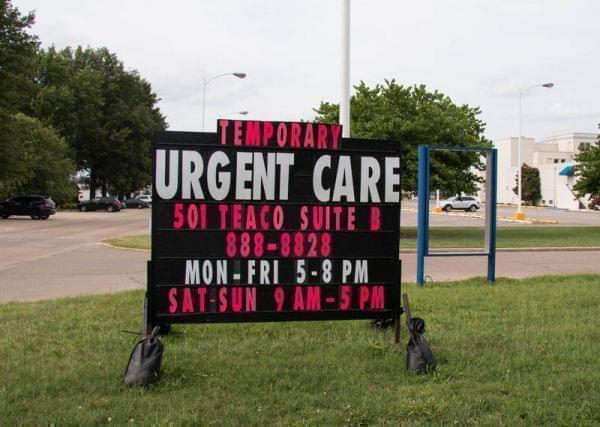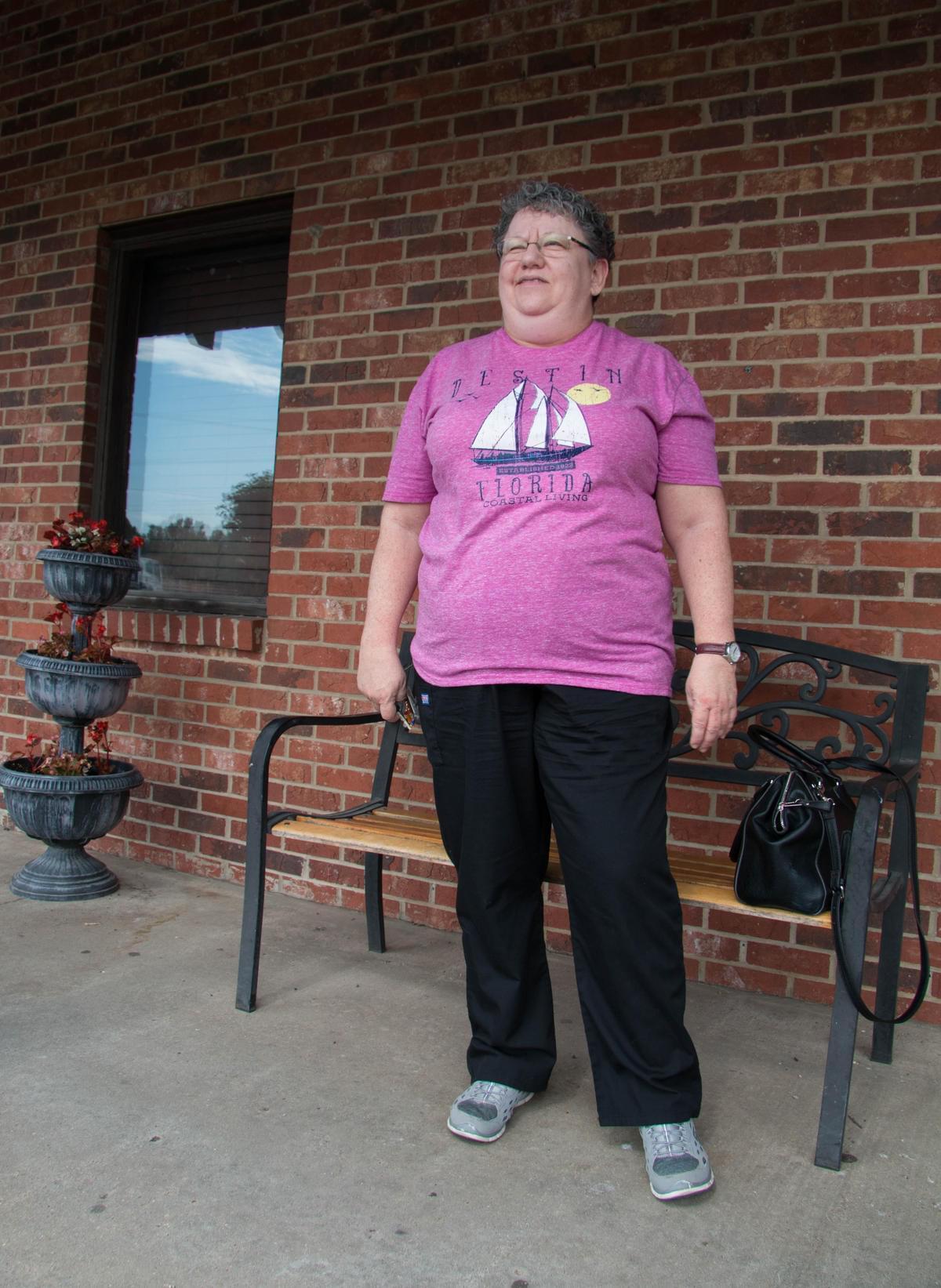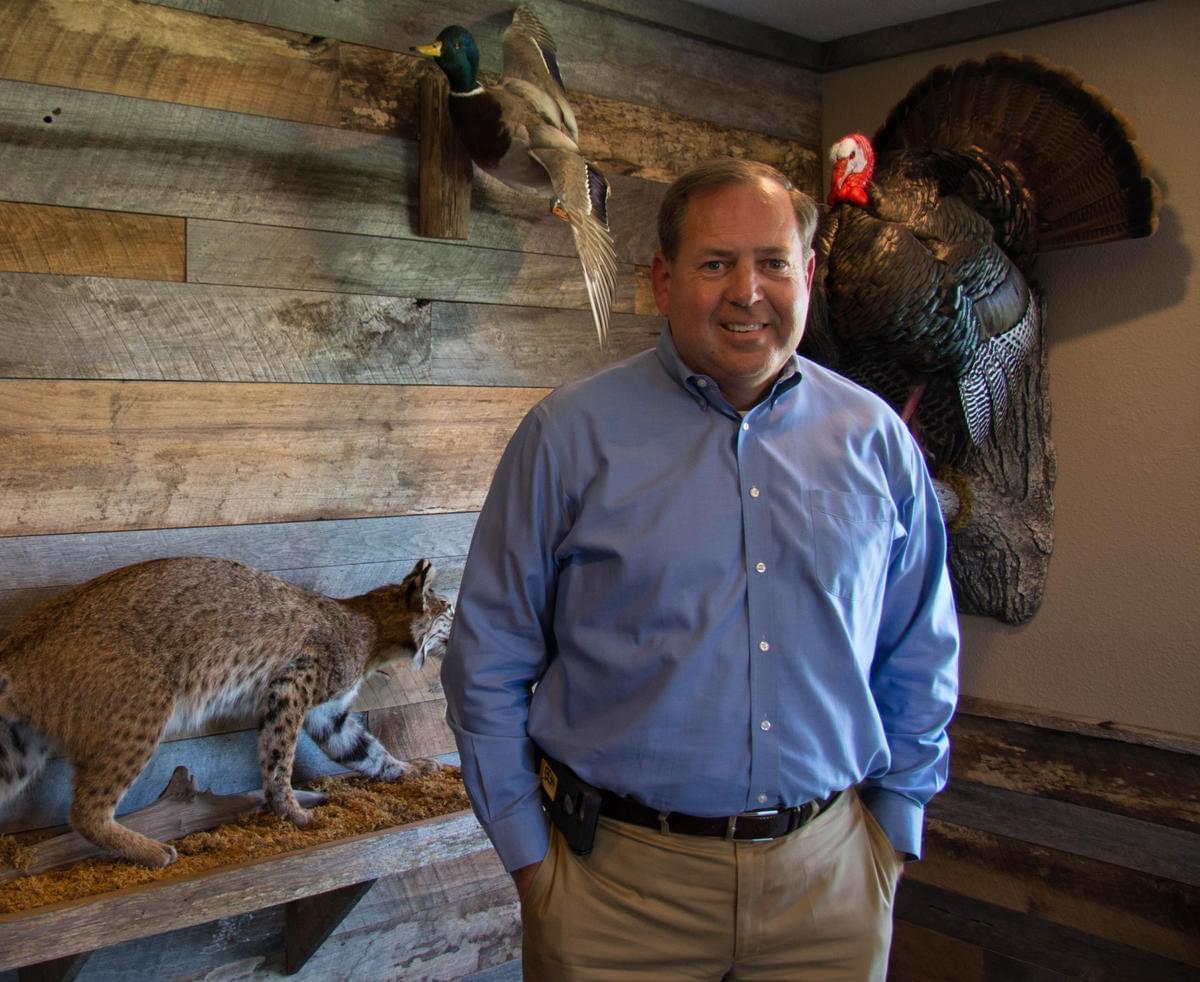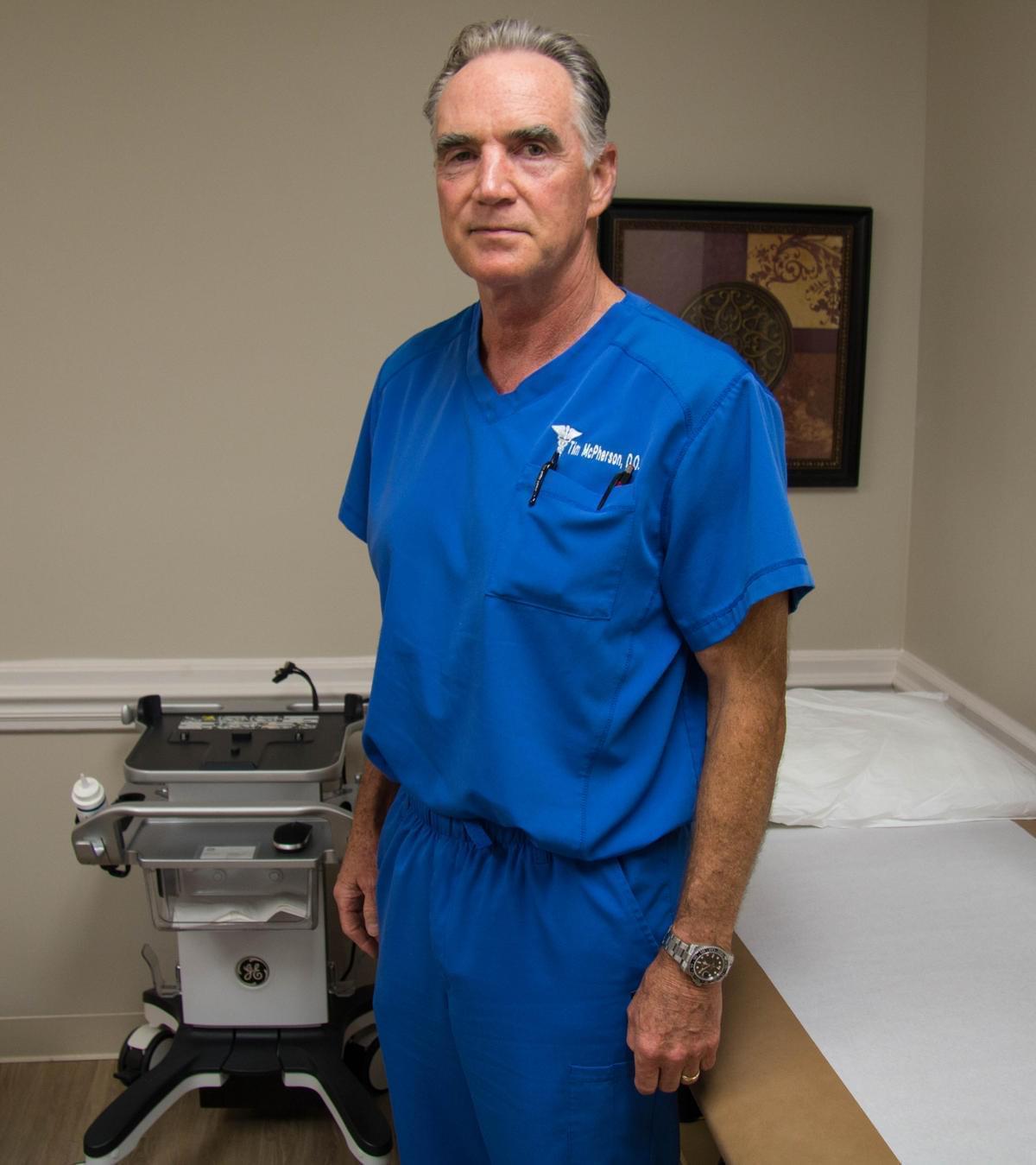After Hospital Closure, A Missouri Community Tries to Fill The Gap in Health and Jobs

A sign behind the closed hospital in Kennett, Missouri advertises a new urgent care center. Bram Sable-Smith/KBIA/Side Effects Public Media
Lee Ann Stuart still wears her nursing scrubs, even though the only work she’s been doing since Twin Rivers Regional Medical Center closed June 11 is to pack boxes of medical supplies to be hauled away.
“It’s strange walking those halls, and they’re empty and the lights are down,” Stuart says. She’s been a nurse at the hospital in rural Kennett, Missouri, for 22 years.
Twin Rivers is the fourth rural hospital to shutter in Missouri in the past four years. The surprise closure has left the 31,000 residents of Dunklin County—the second poorest in the state—scrambling to find medical care while local physicians rush to provide services and elected officials ponder ways to replace the loss of one of the county’s largest employers.
It’s a familiar scene in rural America, where 85 communities have lost their hospitals since 2010.
A surprise closure
Stuart says there were murmurs that something was happening with the hospital. The company that owned the facility—Community Health Systems—lost over $2 billion last year and sold off 30 of its hospitals. Then in March, Twin Rivers closed its behavioral health unit. Still, Stuart says nobody thought the hospital would close.

Lee Ann Stuart was a nurse at Twin Rivers Medical Center in Kennett, Missouri for 22 years.
“We actually thought for the longest time that the hospital was probably selling,” she says. “I had been there 22 years and we had been bought and sold three or four times. It felt like that again.”
When it was announced the hospital would close, putting 275 employees out of work, Stuart says it felt like a rug being pulled out from under her.
“I have to start all over again,” a tough prospect, the 58-year-old says. This month she’ll start a new job at a hospital in Tennessee. That means losing her seniority, but also losing longtime colleagues who saw her through tough times. In 2004 she was diagnosed with cancer and needed chemotherapy and surgery.
“I had all of that done here at my hospital in Kennett. My friends, my co-workers took care of me,” Stuart says.
Now, the closest place to get chemo for some residents here in Dunklin County could be an hour’s drive away. Then there’s the economic impact of losing hundreds of jobs in one small county.
The economic hit
Don Collins was turkey hunting when he got the call the Kennett hospital was closing. Collins is a financial advisor by day and has been presiding commissioner of Dunklin County since 2000. The stripped-down facade of the shuttered hospital is visible out his office window in Kennett.
He says his gut reaction to the news was anger at the company for shutting the hospital down, and sadness for all the people who lost their jobs.
“The official estimate was 275 employees,” Collins says. That doesn’t include the closed behavioral health unit, which puts the number closer to 300.

Dunklin County Presiding Commissioner Don Collins supports two tax initiatives to replace the closed hospital in Kennett, Missouri: a sales tax to build a new hospital and a property tax to offer as a revenue stream to entice a management company to run it.
“The dollar spends seven times before it lands when somebody gets their paycheck. So that’s roughly $98 million a year that [the closure] could impact our county,” Collins says. That’s only if the county can’t replace the hospital.
Replacing a hospital in a town of just 11,000 is a tough sell to outsiders. So the county is trying to build one itself, and then bring in a management company to come run it. In August residents will vote on two tax initiatives: a sales tax to construct a new facility, and a property tax to offer as a revenue stream to entice a potential suitor.
“We hated to do another tax, but we didn’t see another option,” Collins says. “If the citizens in Dunklin County want to have an emergency room and a hospital, they’re gonna have to put skin in the game.”
The new facility would be much smaller than the one that just closed: a 10-bed hospital built in the shadow of a 116-bed behemoth. And the county estimates the new hospital would have only about one-third of the economic impact. But there would be a hospital and an emergency room—two life saving entities the county doesn’t have right now.
Medical gap
Regardless of whether Dunklin County is able to build a new hospital, the closing of Twin Rivers has left a dearth of medical services in the area.
To fill at least some of the medical gap, local physicians have opened a 16-hour-a-day urgent care as well as a specialty clinic. Those facilities operate as extensions of the hospital one county over in Pemiscot County. But the Pemiscot Memorial Health Systems has had its own financial struggles, so the physicians have had to dig into their own pockets.
They’ve used their own money to renovate the operating room in Pemiscot County and to buy a new building in Kennett. They’ve even used their own money to purchase a pricey MRI machine that’s already up and running.

Dr. Tim McPherson is part of a group of local physicians who have put up their own money to reopen medical services in Kennett, Missouri.
“They’ve never had an MRI machine [at the Pemiscot County hospital,]” says Dr. Tim McPherson, a primary care physician in Kennett.
Quick action and personal investment by the physicians in both counties has allowed to them to open up services less than a month after the Kennett hospital shut down.
It also comes with a serious risk. Their urgent care will compete with a second urgent care that just opened in Kennett. St. Bernards Healthcare, a health care system from Arkansas, started this one.
McPherson downplays the competition, saying, “I tell everyone locally it's not a competition if we take care of our patients. We will have plenty of business for each of us.”
Still, the local doctors have put their own money on the line, so if the Pemiscot hospital closes—and it’s nearly gone bankrupt twice in the past 10 years—the doctors could lose a lot of the money they’ve invested.
“If I were here for the money I would have left 31 years ago,” McPherson says. “It’s about the people. It’s about a calling.”
So McPherson says he’ll keep seeing his patients here in Dunklin County as long as he can.
This story was produced by Side Effects Public Media, a news collaborative covering public health.
Links
- Soon-To-Be Mothers In Missouri’s Bootheel Scramble To Find Care After Hospital Announces Closure
- Trump Administration Moves To Alter Drug Discount Program That Many Rural Hospitals Rely On
- To Survive, Rural Hospitals Need To Grow—But The Demographics Don’t Add Up
- Vulnerable Rural Hospitals Face Tough Decisions On Profitable But Questionable Billing Schemes

